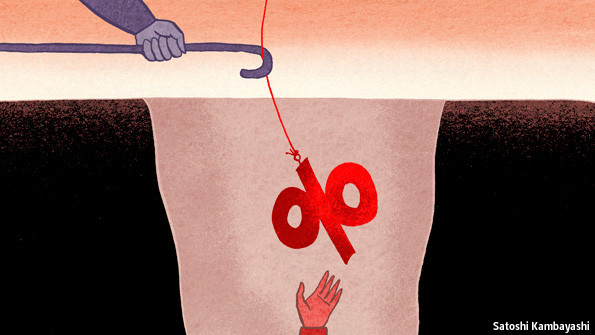Buttonwood
Cap and tirade
A modern proposal with ancient roots
Nov 30th 2013
.

HOW much interest should a borrower be made to pay? It is a debate that goes back thousands of years. Hammurabi, a ruler of ancient Babylon, set an annual limit of 33.5%. Brutus, Julius Caesar’s assassin, was rebuked for charging a rate of 48% when the legal limit was 12%. Aristotle argued that since coins do not “bear fruit”, unlike cattle, which might bear calves while on loan to a neighbour, no interest should be paid at all when borrowing money.
The issue has returned to the headlines again as George Osborne, Britain’s finance minister, announced plans to instruct the Financial Conduct Authority, which regulates consumer finance, to cap the cost of so-called “payday loans”. These loans, often taken out by poor people whose fraying finances leave them short of cash at the end of the month, can carry annual rates of several thousand percent.
In medieval times this would have been forbidden as usury—the charging of excessive rates of interest. The definition of “excessive” varied, although it is safe to say that payday loans would have qualified. Some American states still maintain caps on interest rates for certain types of lenders.
Catholic writers such as Hilaire Belloc distinguished between productive and unproductive loans. Charging interest on a loan to a sick friend who has lost his job is wrong, he argued; charging interest on a loan to a businessman opening a factory is fair enough. The imposition of interest on an unproductive loan is an attempt to “gather harvest from a barren land”.
The sense that creditors are exploiting borrowers was quite common in history, with Shakespeare immortalising the idea in Shylock’s demand for a “pound of flesh”. The sympathies of Charles Dickens were also with the borrowers: the pitiful Mr Dorrit languishing in the Marshalsea prison or the charming Mr Micawber keeping one step ahead of his creditors.
But the mere fact that Mr Dorrit was behind bars indicates that official attitudes to debt had hardened by the 19th century. The insolvent debtor was a deadbeat who had failed to keep his side of the bargain; going into debt was a moral failing.
Modern sympathies lie much more with the borrower, as is perhaps inevitable after decades in which consumer credit has boomed. Most people are in debt at some stage of their lives; indeed the life-cycle theory of consumption states that it is virtually inevitable. If you can borrow when you are young and can look forward to a rising future income, you can smooth your spending over your lifetime.
Governments may be lectured about being spendthrift, at least by right-wing politicians. But businesses and consumers are positively encouraged to borrow. Indeed, when debt growth slows, as it has in recent years, an air of panic develops about how to get it going again. Oddly enough, given the prevailing climate, the policy of quantitative easing, as pursued by central banks, has made it easier and cheaper for governments to fund their deficits without doing a lot to stimulate business and consumer lending. The difficulty in obtaining credit from conventional banks has probably helped spur the growth of payday lending—along with the squeeze in real incomes that has resulted from high unemployment and sluggish wage growth.
So if payday lending is filling a need, why intervene in the market? Provided the terms of the loan are made clear, then it should be up to borrowers to decide whether to accept the costs involved. An interest rate is simply the price of money. And Mr Osborne himself said in September, with reference to an energy-price freeze proposed by the opposition Labour Party, that “attempts to fix prices and confiscate wealth crush endeavour and blunt aspiration.”
The standard argument against interest-rate caps is that they restrict access to capital and drive borrowers into the arms of illegal, backstreet lenders, whose collection methods may be rather unsavoury. But the standard arguments don’t wash in political terms—there is something almost visceral about our dislike of high rates. They smack of exploitation of the vulnerable, of kicking a man when he is down.
Given the debt burden that still weighs down Western economies, there are few votes to be gained by a policy of maintaining the rights of creditors. Debt needs to be reduced by default, inflation or financial repression (keeping interest rates as low as possible). It is hard to shed any tears for the payday lenders, but they will not be the last group to be targeted.
0 comments:
Publicar un comentario